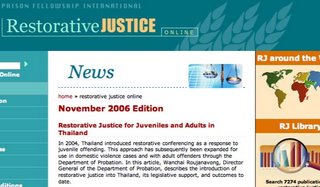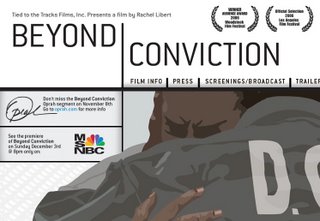Restorative justice is a theory of justice that emphasizes repairing the harm caused or revealed by criminal behaviour. It is best accomplished through cooperative processes that include all stakeholders. Practices and programs reflecting restorative purposes will respond to crime by:Some of the programmes and outcomes typically identified with restorative justice include:
- identifying and taking steps to repair harm,
- involving all stakeholders, and
- transforming the traditional relationship between communities and their governments in responding to crime.
Saturday, November 11, 2006
What is Restorative Justice?
Pioneer: Howard Zehr

From Leading Edge
Howard Zehr is widely recognized as a major restorative justice pioneer. His insights grew out of his work on the first victim offender encounter program in the US. His book, Changing Lenses: A New Focus for Crime and Justice, is considered a foundational work in the restorative justice movement... Howard’s current research focus is on the roles of victims in restorative justice and on restorative justice in severe violence. His new book, Transcending: Reflections of Crime Victims (Good Books, Fall 2001) presents words and portraits of victims/survivors of severe violence.
Restorative Justice Online
RestorativeJustice.org is the most popular and comprehensive source of information in the field. It produces a monthly newsletter covering new developments, books, and people. Among its treasures you will find a list of profiles of leaders in the movement. Its bipartisan orientation means it provides information on all flavours of restorative justice - with a global perspective.

Other highlights:
Restorative Justice around the World
Public Policy Resources
Real People, Real Stories
Book Reviews
Video Review
Full-Text Documents

Other highlights:
Restorative Justice around the World
Public Policy Resources
Real People, Real Stories
Book Reviews
Video Review
Full-Text Documents
Focus: Dan Van Ness
Restorative Justice Online carries many profiles of leaders in the field...


Dan Van Ness directs the Centre for Justice and Reconciliation in providing programs, training and project management to advance the worldwide implementation of restorative justice. He led a development group in designing and implementing the Sycamore Tree Project®, a program that brings groups of victims into prisons for a series of meetings with groups of unrelated prisoners. He has adapted that for use with perpetrators and survivors of genocide in Rwanda... [and] was a principal architect of the Declaration of Basic Principles on the Use of Restorative Justice Programmes in Criminal Matters, which was endoresed by the United Nations in 2002.Read more of this profile
Friday, November 10, 2006
How to Build Local Support for Restorative Justice
What can be done locally to promote restorative justice? This tutorial, based on an article by Kay Pranis, will help practitioners design a strategy for building community support for restorative initiatives... One of the most significant challenges for restorative justice advocates is developing public understanding. Community support is important for any criminal justice programme, but especially for restorative justice programmes with their emphasis on community participation.
John Braithwaite
Meet one of the leaders of the Restorative Justice Movement:
John Braithwaite has contributed to the application of restorative justice principles in both criminal and business crime. John Braithwaite’s special interest is business regulation and white-collar crime. His focus for twenty years has been on restorative and responsive regulatory ideas. As an author, coauthor or editor of numerous books and articles, he has contributed significant research to the application of restorative justice principles to business crime as well as to more traditional forms of juvenile and adult crime.
Crime Victims for a Just Society

Crime Victims for a Just Society
...provides an opportunity for crime victims and others who care to lend their voices and their talents to efforts to create a more just society. Through outreach, education, and training, we can offer information and expertise in cutting-edge concepts, from community policing to restorative justice to violence reduction through a public-health model. Our goal is to help individuals, families, organizations, and neighborhoods explore creative new solutions to the range of crime problems in our communities.
Beyond Conviction
Beyond Conviction: A new movie about restorative justice
"...tells the moving story of three crime victims on a journey toward healing and resolution. The film follows participants in a pioneering program run by the state of Pennsylvania in which victims of the most violent crimes meet face-to-face with their perpetrators.

Beyond Conviction provides a rare glimpse into the lingering pain, questions and regrets for both victims and perpetrators and reveals the bold and difficult path to redemption and reconciliation."
Via Open Discourse
"...tells the moving story of three crime victims on a journey toward healing and resolution. The film follows participants in a pioneering program run by the state of Pennsylvania in which victims of the most violent crimes meet face-to-face with their perpetrators.

Beyond Conviction provides a rare glimpse into the lingering pain, questions and regrets for both victims and perpetrators and reveals the bold and difficult path to redemption and reconciliation."
Via Open Discourse
Monday, November 06, 2006
United Nations Endorsement of Restorative Justice
A critical mass of countries around the world have endorsed the paradigm of Restorative Justice as a response to crime...


In April 2000, the Governments of Canada and Italy submitted a resolution to the UN Commission on Crime Prevention and Criminal Justice proposing that the UN develop international guidelines to assist countries in adopting restorative justice programmes. The proposal was made in the aftermath of the Tenth UN Congress on Crime Prevention and Treatment of Offenders that had seen substantial country interest in restorative justice.More at The Centre for Justice & ReconciliationThe Basic Principles were endorsed by the Economic and Social Council in 2002.
Sycamore Tree Project
One of the most widely used reconciliation programs, currently running in Korea, Columbia, Scotland, Australia, England, New Zealand, Rwanda, and more

A faith-based programme that brings victims into prisons to meet with "unrelated" offenders. The groups discuss together issues related to crime and its consequences.
Wednesday, November 01, 2006
Victims’ Rights in New Zealand
On September 7, PF New Zealand representatives addressed the New Zealand Justice and Electoral Committee Inquiry into Victims Rights. The PF NZ team recommended that the government strengthen victims’ access to victim offender conferencing and victim offender panel s. Read More at PFICJR
Indigenous Justice in Africa
Here's a great intro to Restorative Justice in Africa...
Restorative justice in Africa has been highlighted by recovery of indigenous justice practices, use of community service to address chronic prison overcrowding, national restorative responses to genocide and civil war, and the South African Truth and Reconciliation Commission.These documents discuss restorative justice developments in these countries of Africa: Gambia | Ghana | Namibia | Rwanda | South Africa | Uganda | Zimbabwe
What is Restorative Justice?
Restorative justice is a theory of justice that emphasizes repairing the harm caused or revealed by criminal behaviour. It is best accomplished through cooperative processes that include all stakeholders. Practices and programs reflecting restorative purposes will respond to crime by:Some of the programmes and outcomes typically identified with restorative justice include:
- identifying and taking steps to repair harm,
- involving all stakeholders, and
- transforming the traditional relationship between communities and their governments in responding to crime.
Subscribe to:
Comments (Atom)